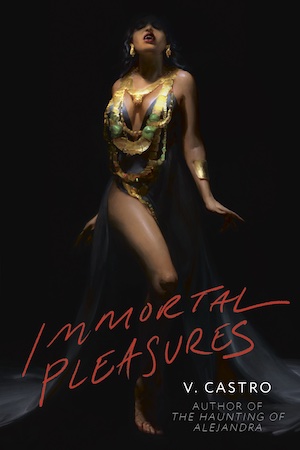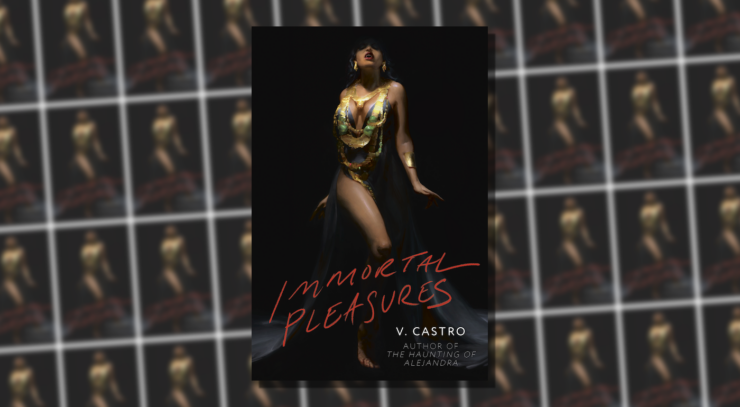When done well, blending real-world history with stories of vampires can click into place magnificently. One of the best-known examples of this can be found in Kim Newman’s Anno Dracula novels, in which Dracula marries Queen Victoria and radically reshapes British society and empire. Newman’s books in this fictional world are maximalist to an extreme, with Newman blending historical figures with characters from the fiction of the late 19th and early 20th centuries.
Stylistically, V. Castro’s Immortal Pleasures goes a different route. Here, too, readers will find vampires, some of whom occupy a very different place in the history books, but the overall effect here is very different. Protagonist and narrator Malinalli is a fascinating study in contradictions, a centuries-old vampire with a knack for business and a penchant for cultural restitution. She’s also a sensualist with a precise sense of what she’s looking for in an intimate setting. As tonally different as this book is from Newman’s riffs on history and vampirism, both Castro and Newman understand one principle very well: Using history well in your work can evoke an even wider world off the page than one might expect.
Immortal Pleasures’ use of history begins with its protagonist. Malinalli, you see, was once known as La Malinche, a Nahua woman who acted as a translator for Hernán Cortés. La Malinche’s role in the conquistadors’ crimes is avidly debated by historians; for her part, Malinalli describes herself as being enslaved by the Spanish and trying desperately to stay alive and find her own path. Eventually, this leads to her becoming a vampire and amassing money and power over the years.
Malinalli narrates the majority of the novel, but occasionally Castro shifts into third person to describe the supporting cast and the novel’s antagonist. The antagonist in question, Castro reveals early in the book, is Cortés himself, who has also become immortal since he and Malinalli last encountered one another.
Buy the Book


Immortal Pleasures
Immortal Pleasures follows Malinalli as she travels from Mexico to Ireland and the United Kingdom in the hopes of securing some stolen artifacts that she plans to return to their rightful home. While there, she meets an Irish horror writer; the two quickly begin an intense relationship. Lurking in the background is Cortés, who has also built a kind of financial empire, and is looking to settle old scores.
It’s worth mentioning here that Castro’s take on vampirism is relatively similar to the approach taken by Suzy McKee Charnas in The Vampire Tapestry. We’re not quite in the realm of a science fictional explanation for surviving solely on blood, but Malinalli is unharmed by the sun and unfazed by religious iconography. These vampires are more in the vein of apex predators than supernatural shape-shifters; if they can turn into bats or mist, they don’t do so here. Cortés’s business dealings also have something to do with vampires’ unique properties—and suggests that, despite his transformation, his metaphorical bloodlust hasn’t been sated by his literal one.
Malinalli and Cortés are not the only historical figures to show up here, but to reveal the full cast of characters would be to spoil one of the more ambitious aspects of Immortal Pleasures’ backstory.
Malinalli’s taste in music is worth citing here as well. She describes ending a kind of self-imposed exile from the wider world in the 1970s, and so her fondness for music from around that period—including mentions of the music of Foreigner and Nile Rodgers—feels true to the character. (Though it is curious that Neil Young doesn’t bear a mention, given that his 1970s discography includes the songs “Cortez the Killer” and “Vampire Blues,” both of which feel thematically appropriate here.)
Castro’s use of actual history does a memorable job of giving the conflict in this novel a deeper resonance. In making the conflict featured in Immortal Pleasures an outgrowth of a historical conflict, Castro deepens the connections between her characters and adds an unexpectedly epic scope to the narrative. True, this is a novel about immortal characters—but, as its title suggests, there’s a space there for pleasure as well, whether in the form of a sexual connection, listening to a great song, or witnessing an evocative sunrise.
Still, all of these elements wouldn’t work as well as they do without a memorable central character to tie it all together. Malinalli has a distinctive voice that blends a slight weariness from her centuries on Earth with a certain lust for life. We’ve had plenty of brooding vampires (and, more broadly, immortals) in fiction; Malinalli is refreshing for being a character who seems to enjoy eternal life. Here’s one moment from her description of a (morally conflicted) visit to the British Museum:
Poor Cleopatra lies behind glass, her fake eyes staring at nothing. She has been there since 1832. Seeing her small body wrapped in cloth and her painted face sent a shiver down my back. I thank the heavens I escaped that fate. My own history is still alive and biting.
Immortal Pleasures tells the story of its narrator at a transformational point in her life—encountering new faces and old enemies alike. Part of the fun of reading this novel comes from its protagonist’s engagement with the world—but some also comes from the way Castro evokes an even larger, stranger history waiting to be unearthed.
Immortal Pleasures is published by Del Rey.










